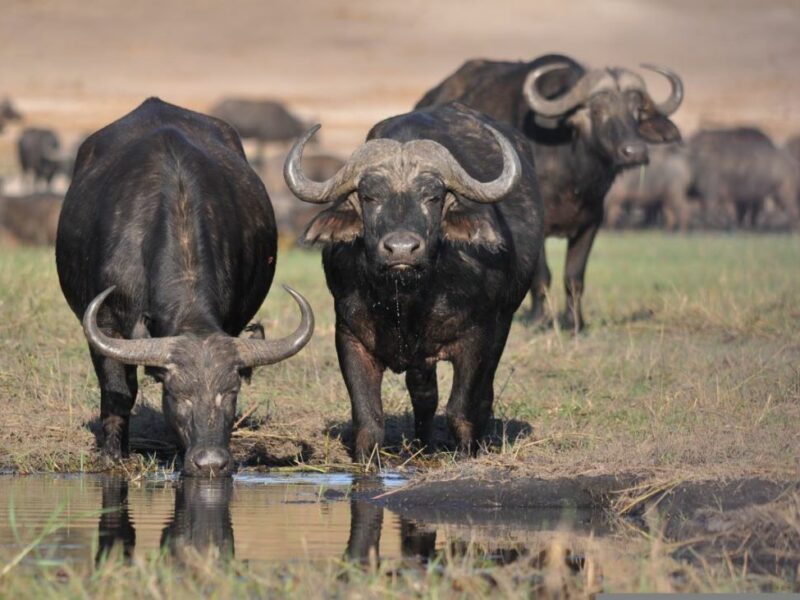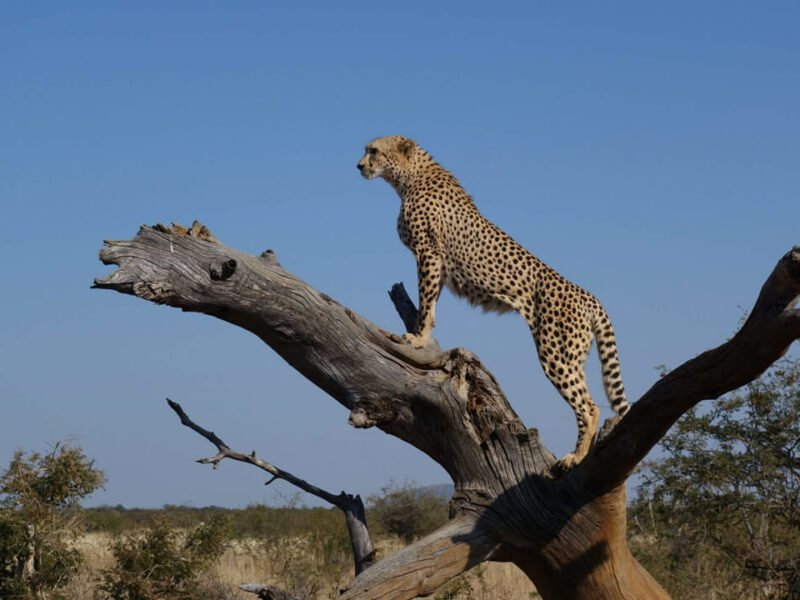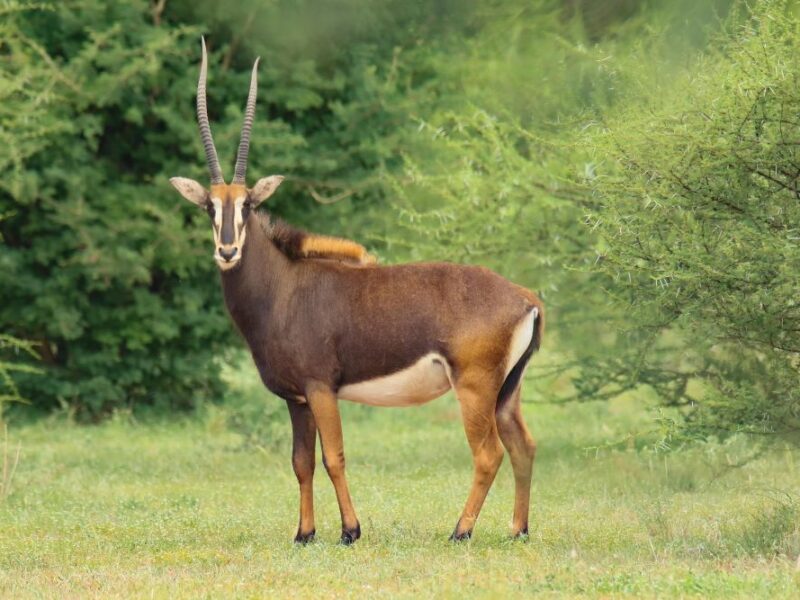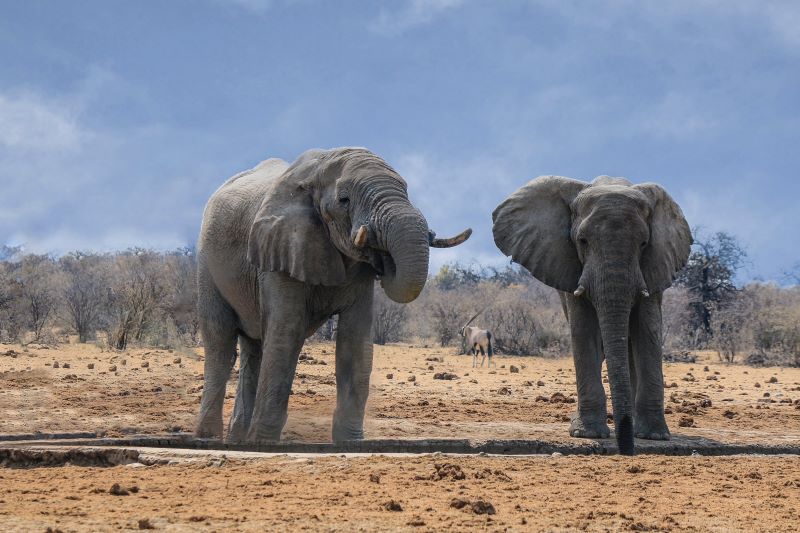When we talk about big 5 hunting Africa, we know for certain that the game hunting safari is going to range in days away from home between 10-21 days, excluding local or international travel time. Big 5 hunting in Africa compared to African plains game hunting safaris are often logistically more challenging and substantially more expensive, due to the remoteness of the location, operating costs, and trophy fees of these animals.
[DYNAMIC-BLOGTABLEOFCONTENT]
Frequently Asked Questions
What does the Big Five mean for Hunting?
The Big 5 is a historical reference made to hunting dangerous game animals on foot, including:
- The African elephant,
- Rhino
- Cape buffalo,
- Leopard, and
- the “King of the Jungle,” the lion.
Being exceptionally dangerous, it was a feat for the hunter to complete a successful game hunting safari and return home, alive and with a shipment full of African trophies after their African hunts.

Which African County has the Best Hunting?
The best African countries for hunting in Africa include South Africa, Zimbabwe, Namibia, Zambia, Tanzania, and Mozambique. Over 60,000 big game hunters book African hunts and visit the “Dark Continent” annually.
What is the Most Expensive Hunt in Africa?
When it comes to hunting, size certainly counts. The most expensive hunt in Africa would be for an 80-100-pound African elephant. Elephant tusks, depending on the game hunting location, will average between 40-50 pounds.
While there are still some big bulls traversing the continent, they are very, very rare. Many decades ago, 80-100-pound elephants were more readily available.
Safari Planning Considerations When Big Five Hunting in Africa
Dangerous game hunting in Africa costs money and big game hunting does not come cheaply. What is even more valuable than money is time, something that we never have an abundance of. As we all know so well, time waits for no man!
Plan your Primary Species for your Hunting Safari
When planning a big game hunting safari, at the top of the list will also be the primary species. The primary species will determine the location and the length of the hunting safari. By way of example, should an elephant, lion, or leopard be the primary target species, a minimum hunting safari duration of twenty-one days will be required. If Cape buffalo are the primary game hunting choice, the hunter can get away with between 7-14 days, especially if choosing fenced-in vs. free range.
When planning the hunting safari, always consider one pertinent point: You may get lucky!
Game Hunting takes Time – Or does it?
Hunting elephants takes time! The hunting safari needs to find large tracks, follow them for a few days, and then hopefully come across an old and suitable bull elephant. However, he may not fit the trophy criteria, due to small ivory or a broken tusk. He may even get “spooked” and disappear into another concession, or over the border. Then the big game hunting process of finding, tracking, and following starts all over again, eating away at the days.
But the hunter may just get lucky and find the perfect bull elephant within just a few days.
The same principle will apply when lion hunting or hunting leopards. Never underestimate the luck factor when it comes to big game hunting safaris. Additionally, it may take many nights of baiting before the cat comes in.
What then is planned for during the daylight hours, or the remaining days of the safari following a successful hunt? If the hunter gets lucky in week one, two weeks is a long time to sit around, regretting that nothing further was planned.
Choose some add-on Animals for your Africa Hunts
So, when Big 5 hunting Africa-style, always have a few “add-on” species that can be targeted. Check with the outfitter or booking agent what else may be available or endemic to that area.
It is important to check and note for certain species, which may become an addition to the dangerous game primary target animal, that a CITES permit may be required. These permits need to be arranged before the commencement of the hunting safari so the outfitter needs to be contacted weeks in advance so that the necessary arrangements can be made.
The hunter will also need to take cognizance of the fact that a different caliber rifle may be needed for the additional species and will need to plan accordingly.

Additional Species Suggestions While Big Five Hunting in Africa
- Crocodiles and hippos are always a great add-on, especially if the hunting safari is focusing on cats such as leopards and lions. This will obviously depend on the location as these dangerous seven members occupy all the waterways.
- Exotic African plains game makes for awesome additions and can include Sable, Roan, and Tsessebe.
- If the game hunting safari is focussed on Cape buffalo in fenced-off areas like South Africa, a wide variety of color variants will also be available. These antelope will include golden wildebeest, golden oryx, black impala, and saddle-back impala.
- If the hunting safari is in the north of Namibia for elephants, endemic species will include the Damara dik-dik and black-faced impala.
- Favourite antelopes to combine with a Cape buffalo hunt in Zambia will include Sitatunga and black lechwe, along with the Chobe bushbuck.
- While Tanzania is a premier big game hunting destination for leopards, lions, and buffalo, the country is well populated with Thomson’s gazelle, gerenuk, and white-bearded wildebeest.
- In locations such as the Caprivi Strip, in Namibia, or Lake Cahora Basa while hunting buffalo, adding a hippo or crocodile is a wise choice. If the game hunting safari is in the warmer months, booking some tiger fishing is an excellent choice.
- Hyena hunting, for spotted, brown and striped hyenas is a terrific addition to a big game hunting safari. These predators occupy the same territories and respond to baits.
- While on safari for leopards, cheetah hunting in Namibia is a consideration. Cheetah hunting in Namibia requires a CITES permit to enjoy the opportunistic game hunting experience.
- Big five hunting in Africa cannot exclude all the favorite “nighttime critters”, including black-backed jackals, porcupines, caracals, honey badgers, and bat-eared foxes.
- Big 5 hunting in Africa allows the hunter to travel to numerous African destinations. Do not forget our members of the Tiny 10 antelope who may be endemic to those areas.

Using the Time on your Hunting Safari Effectively
Big Five hunting Africa cannot be limited to only the primary target species. The hunting safari would just not be cost-effective, and available hunting time always needs to be fully utilized.
African countries offer a wide variety of hunting, fishing (deep-sea and freshwater), and local activities, so ensure that your African hunts are meticulously planned.
For further options on animals to include for an add-on, see Specialty Animals, Dangerous Game, African Plains Game, and Exotic Plains Game species.
Author: P.C. van Wyk
